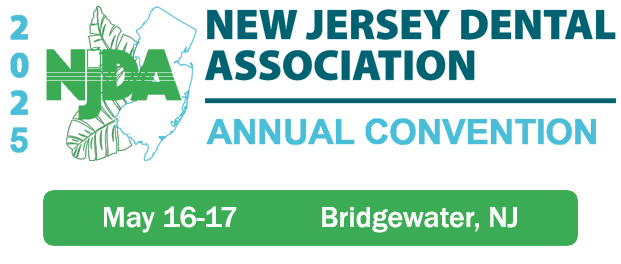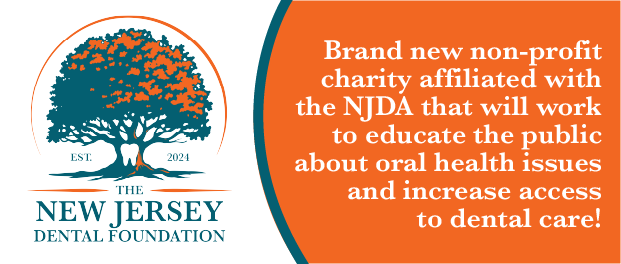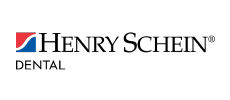Perfect Smiles Start With You
Smile Design Boot Camp is an intensive 4-day course that equips dentists with the confidence and knowledge to incorporate techniques for single-arch and full mouth rehabilitation into their practice. Sign up to secure a spot!
It's a NEW Convention!
Registration is now open for NJDA’s Annual Convention in Bridgewater on May 16-17! Our annual gathering of the NJ dental community will feature top-tier CE courses on a wide range of topics, a rooftop party, and more.
The Party of the Year!
The NDJA Celebration on May 16 is going to be huge! We are taking over the entire 7th floor of the AC Hotel including three bars, outside patio, pool table, DJ and dance floor!
New Jersey Dental Foundation
Take a moment to learn more about NJDA's brand new initiative to help the public learn more and gain access to oral healthcare! Read the mission statement, governance, structure and more.
This is membership your way
Renew today to explore new lower membership costs and customization offerings.
Helping Members Succeed
The New Jersey Dental Association is the voice of the dental profession and a strong proponent of oral health in the state. Members are part of a vibrant community of dentists encompassing 12 local dental societies as well as the American Dental Association. Members engage in educational programs, have access to dentist-centric relationships and tools to navigate the business of dentistry and their careers, as well as benefit from dedicated advocacy that protects the interests of the profession. The organization is run by member-dentists with the support of a team of professionals at NJDA Headquarters. NJDA members never practice alone!
UPCOMING EVENTS
DENTAL NEWS AND NOTES
Hear Clearly
Safety Tips to Prevent Hearing Loss
Dentists are exposed to the noise of handpieces and ultrasonic scalers, at levels of 60-99 decibels. While this level of noise presents only a minimal risk of hearing loss, sustained exposure can result in sensorineural hearing loss. Just as you tell your patients to brush and floss to prevent oral diseases, you can practice what you preach and adopt some preventive measures to preserve your hearing.
Sensorineural hearing loss is not reversible, but it is preventable. Exposure to high-frequency, noisy equipment is unavoidable in a dental practice, thus prevention is the key to protect and preserve your hearing.
Learn to recognize the symptoms and causes of this workplace hazard. Follow the easy and prudent tips at the end of the article to prevent hearing loss before it has even started.
Symptoms
Sensorineural hearing loss results in diminished intensity of conversation and other sounds, sound distortion, and difficulty understanding complex sounds. High tones are particularly difficult to hear, and enunciations of the letters s, f and z may not be heard at all. Furthermore, it may be difficult to hear conversation in a noisy room or where there is surrounding environmental noise. In some cases the hearing loss may be accompanied by tinnitus (ringing, buzzing or other noises in the ear). The degree of hearing loss may be mild, moderate or severe.
Causes
Sensorineural hearing loss is only one of several types of hearing loss. It is usually due to damage to the corti hair cells in the cochlea. The hair cells may be damaged by medications, infections, or trauma to the ear, but a common cause is the trauma of loud noises exceeding 90 decibels. Loud noises heard frequently or regularly, over a period of years, can gradually damage the hair cells.
An important factor for any dentist to consider is that you are exposed to the noise of dental equipment for 15-45 minutes at a time, several times a day, over a period of many years. Although the 90-99 decibel level of noise that is produced from some pieces of dental equipment may pose a relatively minimal risk to hearing, the daily exposure to that level, over years, may contribute to damage to the hair cells in the cochlea. In general, exposure for eight hours or longer to noise levels between 85-90 decibels is harmful. The diagnosis of a sensorineural pattern hearing loss is made through audiometry.
Tips for Preventing Noise-Induced Sensorineural Hearing Loss
- When using dental equipment, wear ear plugs or noise-cancelling (over-the- ear) headphones.
- In selecting dental equipment, consider its noise level as a factor in your purchasing decision
- Have your hearing tested to establish a baseline of the status
- Monitor your hearing acuity on a regular basis to have any problems correctly diagnosed and to benefit from early intervention
Other Resources:
- American Speech Language Hearing Association
- National Institute for Occupational Safety and Health (NIOSH)
The above content was taken from "Safety/Ergo Tips: Hearing Loss" that was developed through OSHA’s Alliance Program as a product of the OSHA and ADA Alliance. It’s intended for informational purposes only. It does not necessarily reflect the official views of OSHA or the U.S. Department of Labor.
Contact Us
Phone: 732-821-9400 or dial the Staff Directly
Fax: 732-821-1082 | Email: info@njda.org | Follow us @NJDentalAssoc
One Dental Plaza, North Brunswick, NJ 08902













